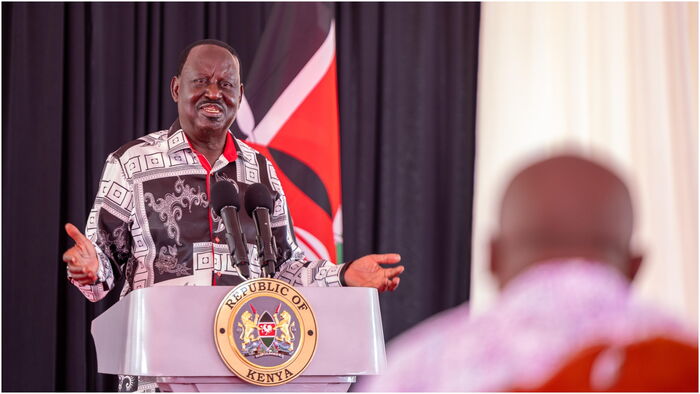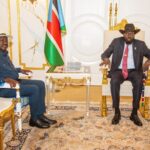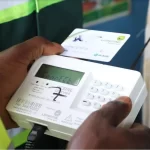The government of South Sudan has distanced itself from claims made by former Kenyan Prime Minister Raila Odinga regarding his recent diplomatic visit to Uganda.
Days after Odinga suggested that President Salva Kiir instructed him to seek Ugandan President Yoweri Museveni’s approval before meeting South Sudan’s detained First Vice President Riek Machar, officials in Juba have strongly denied any such directive.
Odinga traveled to Juba on an Intergovernmental Authority on Development (IGAD) mission last week, seeking to mediate the escalating political crisis in South Sudan. The detention of Machar, leader of the Sudan People’s Liberation Movement-in-Opposition (SPLM-IO), has sparked fears that the fragile 2018 peace agreement—Revitalized Agreement on the Resolution of the Conflict in South Sudan (R-ARCSS) could collapse.
However, after failing to secure a meeting with Machar, Odinga flew to Kampala, reportedly under instructions from Kiir’s administration to first consult Museveni before proceeding.
“I asked to be allowed to talk to Dr. Machar, but they were not able to allow me to see him,” Odinga told reporters. “They recommended that I meet with President Museveni.”
During a press conference on Monday, South Sudan’s Presidential Press Secretary, David Amuor Majur, dismissed Odinga’s claims as a “misrepresentation of diplomatic norms and principles.” Majur insisted that President Kiir did not send Odinga to Uganda and that his trip to meet Museveni had been pre-arranged independently of South Sudan’s government.
“The suggestion that His Excellency General Salva Kiir Mayardit, President of the Republic of South Sudan, requested Right Honorable Raila Odinga to meet with the President of Uganda is misrepresenting diplomatic norms and principles,” Majur stated.
He added, “The Right Honorable Odinga’s mission to Uganda was pre-arranged. Nobody has sent him to go and talk to President Museveni.”
The denial from Kiir’s administration raises further questions about the transparency of ongoing diplomatic efforts to resolve the crisis. If Odinga was indeed acting under IGAD’s mandate, the refusal to grant him access to Machar signals growing resistance from Juba towards external mediation.
The situation in South Sudan has been tense since the arrest of Machar and several SPLA-IO officials, with the government accusing them of attempting to destabilize the country. The SPLM-IO has condemned the arrests as a violation of the 2018 peace agreement, warning that the move could push South Sudan back into armed conflict.
Regional and international actors, including the United Nations, African Union, and Western diplomatic missions, have expressed deep concern over these developments. They have called on President Kiir to release Machar and reaffirm his commitment to the peace agreement.
Adding to the growing tensions, Uganda has also become increasingly involved in the crisis. On March 10, Uganda’s Chief of Defence Forces, Gen. Muhoozi Kainerugaba, announced the deployment of the Uganda People’s Defence Forces (UPDF) to South Sudan at Kiir’s request.
“UPDF Commandos arriving in Juba to support South Sudan People’s Defence Forces in the current crisis,” Gen. Muhoozi stated. “Operation ‘Mlinzi wa Kimya’ has begun.”

Uganda’s involvement has raised concerns among opposition groups, who fear that Museveni’s military presence could further tilt the balance of power in favor of Kiir, making meaningful negotiations more difficult.
With South Sudan’s government openly dismissing Odinga’s claims, the rift between regional diplomatic efforts and Juba’s leadership appears to be widening. The next steps by IGAD, the African Union, and other key stakeholders will be crucial in determining whether South Sudan can prevent a return to full-scale conflict.
For now, the fate of Riek Machar remains uncertain, and the fragile peace agreement hangs in the balance as political maneuvering continues at the highest levels.








